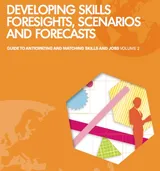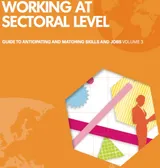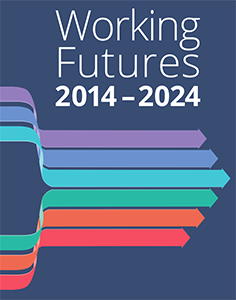IER News & blogs
Bad jobs, the bad jobs trap and the Brexit vote
Despite all of the talk about inter-generational betrayal by the old of the young, the largest ratio to vote leave was amongst low-skilled workers (70%). Their frustration and desire for something to change is understandable. They are in bad jobs, are too often stuck in these jobs and jostle more in these jobs with migrant workers. Their situation is a symptom of three developments that have occurred in the UK labour market since the economic crisis. First, job polarisation has consolidated. Second, non-standard employment has increased in the worst jobs. Third, UK-born workers have benefitted less from employment restructuring.
IER researchers contribute to the Government Office for Science Future of skills and lifelong learning Foresight project
The Government Office for Science is looking at how changes in technology and an ageing population affect what skills the UK will need in the future. The project also considers how investment in skills and encouraging lifelong learning can have a positive impact on productivity. This project aims to provide policy-makers with evidence on the current and future state of skills and lifelong learning in the UK. IER researchers have contributed to the evidence base on:
Skills and Lifelong Learning: Gaps in Training Provision - This report looks at current trends and challenges for policymakers in the UK skills system, including how geography affects provision of skills, individual access to skills and training, the role of migration and the role of careers advice.
- Green, A., Hogarth, T., Barnes, S-A, Gambin, L. and Sofroniou N. (2016) The UK's Skill System: Training, Employability and Gaps in Provision. London: Foresight, Government Office for Science.
The UK skills system: how aligned are public policy and employer views of training provision? - This report explores trends and developments in UK skills policy, employer views on training and issues in realising an employer owned skills system.
- Green, A. and Hogarth, T. (2016) The UK skills system: how aligned are public policy and employer views of training provision? London: Foresight, Government Office for Science.
Working Futures 2014-2024
Working Futures 2014-2024 is the sixth in a series of quantitative assessments of employment prospects in the UK labour market over a 10 year horizon, created for the UK Commission for Employment and Skills by Cambridge Econometrics and the Warwick Institute for Employment Research. The projections were prepared in late 2015 and early 2016 and are based on a view of the likely medium-term evolution of the economy at that time. With the support of UKCES and the Department for Education, the Warwick IER created a web page from which all the reports and outputs from these projections can be downloaded. The main output of the projection exercise is a set of Excel workbooks containing historical trends and future prospects for output and employment by industry sector for the UK and its constituent nations and the English regions. Workbooks for smaller geographical areas are also being made available (to authorised users only).
Guides to anticipating and matching skills
Two guides, authored by IER’s Professor Rob Wilson, which are part of the ETF, ILO and Cedefop series of guides on skills anticipation and matching have been published.
 Volume 2 covers the development of skills foresights, scenarios and skills forecasts, and aims to support setting up skills forecasting systems at national level by means of quantitative and/or qualitative approaches. The guide is intended specifically for countries which are starting to develop systems of skill needs anticipation.
Volume 2 covers the development of skills foresights, scenarios and skills forecasts, and aims to support setting up skills forecasting systems at national level by means of quantitative and/or qualitative approaches. The guide is intended specifically for countries which are starting to develop systems of skill needs anticipation.
Bakule, M., Czesaná, V., and Havlícková, V. (Part A), Kriechel, B., Rašovec, B. and Wilson, R. (Part B) (2016) Developing Skills Foresights, Scenarios and Forecasts - Guide to Anticipating and Matching Skills and Jobs (Vol. 2). Luxembourg: Publications Office of the European Union, (ISBN: 978-92-9157-655-5)
 Volume 3 examines sectors as the key points where changes in skills demand occurs, the term sector being used to define specific areas of economic activity. It provides an overview of the role of sectoral bodies and what they do in anticipating changing skills needs. The country case studies show how skills are analysed at the sector level in different contexts and conditions.
Volume 3 examines sectors as the key points where changes in skills demand occurs, the term sector being used to define specific areas of economic activity. It provides an overview of the role of sectoral bodies and what they do in anticipating changing skills needs. The country case studies show how skills are analysed at the sector level in different contexts and conditions.
Wilson, R., Tarjáni, H. and Rihova, H. (2016) Working at Sectoral Level - Guide to Anticipating and Matching Skills and Jobs (Vol. 3). Luxembourg: Publications Office of the European Union, (ISBN: 978-92-9157-657-9)
IER welcomed Dr Asaf Darr
IER welcomed Dr Asaf Darr, Associate Professor in the Department of Sociology and Anthropology at the University of Haifa. Dr Darr visited IER to develop collaborative writing projects around technology and work. Dr Darr's research focuses on the sociology of occupations and professions, and the sociology of markets.
Dr Asaf Darr, Associate Professor in the Department of Sociology and Anthropology at the University of Haifa. Dr Darr visited IER to develop collaborative writing projects around technology and work. Dr Darr's research focuses on the sociology of occupations and professions, and the sociology of markets.

